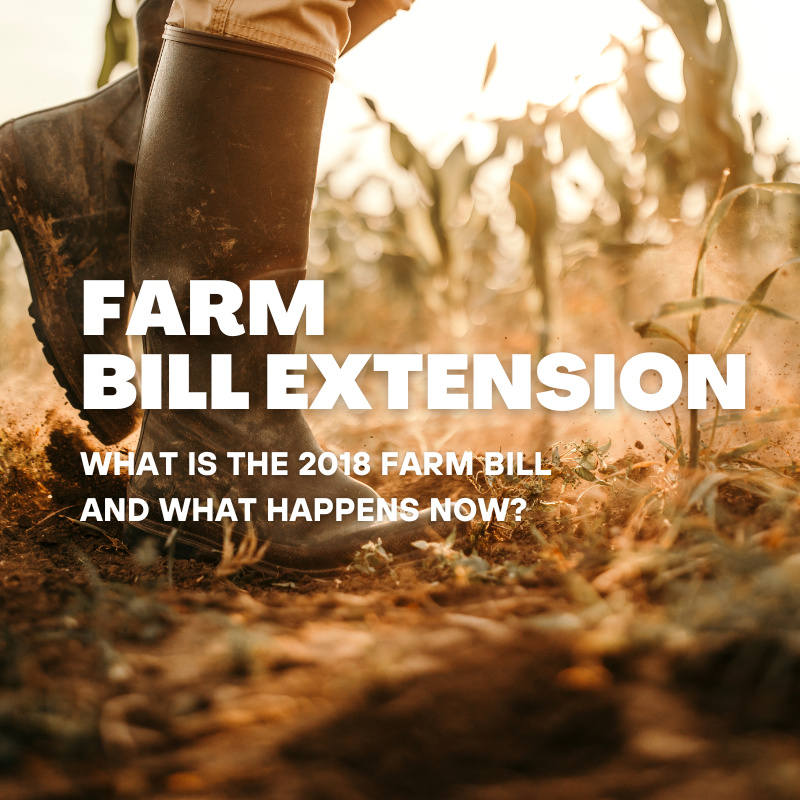The 2018 Farm Bill, officially known as the Agricultural Improvement Act of 2018, set various policies related to agriculture, nutrition, conservation, and other aspects of the U.S. farm and food system. The Farm Bill is typically renewed every five years, but there are instances where it might be extended or subject to delays in the reauthorization process.
Without more specific information, it’s challenging to determine why there might have been an extension in a particular case. Extensions could occur for various reasons, such as disagreements on certain provisions, legislative priorities, or external factors affecting the legislative calendar. Political considerations, negotiations, and the complexity of issues addressed in the Farm Bill can all contribute to delays or extensions.
The Agricultural Improvement Act of 2018, is still in effect as of January 2023. However, please note that the status of legislation can change, and there might have been developments or changes since then.
To get the most current information on the status of the 2018 Farm Bill, We recommend checking official government sources, such as the website of the United States Department of Agriculture (USDA) or other reliable legislative databases. These sources will provide up-to-date information on the status and any potential updates or changes to the Farm Bill.
In 2018, the agricultural landscape in the United States underwent a significant transformation with the passage of the Farm Bill. Central to this overhaul was the legalization and regulation of hemp, a versatile plant with a rich history. In this blog, we’ll explore what the 2018 Farm Bill entails and why it has a profound impact on the production and distribution of hemp products.
Understanding the 2018 Farm Bill:
Hemp Definition and Legalization:
The 2018 Farm Bill brought about a crucial change in the legal status of hemp by redefining it as distinct from marijuana. Hemp, defined as cannabis with a THC content of 0.3% or less, was removed from the list of controlled substances. This legalization marked a significant departure from previous regulations.
Pilot Programs and Research:
Before the 2018 Farm Bill, hemp cultivation was permitted only under pilot programs for research purposes. The new legislation expanded these programs, allowing for more extensive research on hemp cultivation, market potential, and various applications.
Commercial Production:
With the legalization of hemp, the 2018 Farm Bill opened the door for commercial hemp production on a broader scale. Farmers could now cultivate hemp for various purposes, including fiber, seed, and extracts.
Interstate Commerce:
The Farm Bill facilitated interstate commerce of hemp-derived products. This meant that hemp and its derivatives, such as CBD (cannabidiol), could be transported and sold across state lines, promoting a more robust and interconnected hemp industry.
Impact on Hemp Products:
CBD Boom:
The legalization of hemp paved the way for the explosive growth of the CBD market. CBD, a non-psychoactive compound found in hemp, became a popular ingredient in various products, including oils, tinctures, edibles, and topicals.
Diversification of Hemp Products:
The Farm Bill encouraged the development of a wide range of hemp-derived products beyond CBD. From textiles and paper to building materials and biofuels, the versatility of hemp was unleashed, contributing to a more sustainable and diverse market.
Economic Opportunities:
The legalization of hemp created new economic opportunities for farmers, processors, and businesses involved in the hemp industry. It stimulated job creation and investment in a sector that had long been underutilized.
Quality and Standards:
As hemp products gained mainstream acceptance, the industry saw an increased emphasis on quality control and product standards. Consumers could expect more consistency and transparency in the production and labeling of hemp-derived goods.
Challenges and Future Outlook:
Regulatory Hurdles:
Despite the positive changes, challenges remain. The regulatory landscape for hemp-derived CBD is still evolving, with ongoing efforts to establish clear guidelines and standards.
Market Saturation:
The rapid growth of the CBD market led to concerns about oversaturation and the need for differentiation among products. As the industry matures, businesses must navigate these challenges to remain competitive.
The 2018 Farm Bill marked a watershed moment for the hemp industry, transforming it from a niche market to a thriving sector with vast economic potential. As the hemp landscape continues to evolve, it’s essential to stay informed about regulatory developments and market trends. The impact of the Farm Bill has been profound, unlocking opportunities and setting the stage for the continued growth of the hemp industry in the United States.





